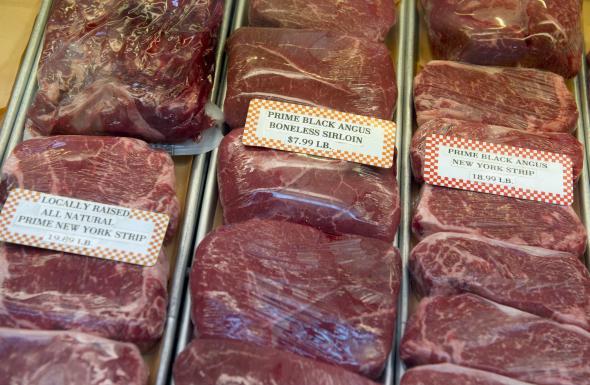I’ve been told by a vegetarian that since rigor mortis sets in immediately after death, the tenderness of meat is due to decomposition. Is there any truth to this statement?
This question originally appeared on Quora.
Answer by Joshua Engel, enthusiastic eater and adventurous cook:
Yes, it’s due to decomposition. Rigor mortis is caused by ions diffusing in the muscle, causing the muscle to contract. This actually takes a few hours to a day, rather than immediately.
After a few days, the proteins degrade, and the muscles unclench. The process can continue for weeks, making the meat more and more tender. That’s one reason why really high-quality beef is aged. (It also loses moisture, increasing the flavor. This isn’t generally done with commercial poultry, which gets tender more quickly, though game birds can be very tough and are often aged a lot.)
It’s decomposition, but very carefully controlled. You want the right kind of decomposition, the kind caused by enzymes in the animal itself, rather than from some outside bacteria or mold. That’s why aging is done at temperatures too cold for microorganisms to reproduce. And that’s why it takes a long time: The enzymatic reactions proceed more slowly.
There are technological ways to speed it up, such as zapping it with electricity, and a lot of commercial beef is subjected to that. But aging it in a cool place is better. Allowing a roast to sit, uncovered, in the refrigerator for a few days will improve the flavor and texture. (For smaller pieces of meat, it’s not advised: The cold doesn’t completely stop microorganisms, and the smaller the cut, the larger the surface area.)
As for what to make of it: All of your food decomposes. Even if you are a vegetarian, your food is decomposing in the fridge. Meat is actually improved by a (carefully managed) rest in the refrigerator, but no matter what, you’re still racing other microorganisms to anything you might want to eat.
In fact, if you have food that doesn’t rot, you might consider whether you really want to eat it. That’s not a hard-and-fast rule by any means, but most people’s diets would be improved by eating more of the foods that have to be eaten fresh. Managing freshness is a bit more complicated for meats than for vegetables, but it’s still very nutritious for you and better than meats that have been processed to be so stable that the microorganisms don’t want them, either.
More questions on Meat:
